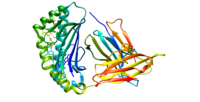
Photo from wikipedia
Researchers have sought to develop an effective protocol for paternity analysis using cell-free DNA (cfDNA) in maternal plasma. The use of massively parallel sequencing (MPS) technology for SNP testing is… Click to show full abstract
Researchers have sought to develop an effective protocol for paternity analysis using cell-free DNA (cfDNA) in maternal plasma. The use of massively parallel sequencing (MPS) technology for SNP testing is attractive because of its high-throughput capacity and resolution to single-base precision. In this study, we designed a customized SNP panel for cfDNA sequencing that includes 720 short amplicons (< 140 bp) targeting SNPs on the autosome and Y chromosome. The systemic performance was evaluated using the Ion Torrent PGM, indicating balanced coverage among most of the included loci, except for 78 poorly performing SNPs that were observed to have an inconsistent allele balance, lower coverage reads or high background signals. Then, the custom panel was used to perform cfDNA genotyping in maternal plasma from 20 pregnancies in the first and second trimesters (9 to 21 weeks). By establishing an allele fraction cutoff of 2.0%, 53 to 128 autosomal SNP loci were considered informative for paternal origin. Validation results in foetal samples showed that 49.43% to 100% of the real paternal alleles were accurately identified, with incorrect alleles encountered in 3 cases. The concentration of foetal cfDNA ranged from 4.28% to 10.70%. Our results show that this amplicon-based sequencing strategy could be utilized in analysing paternally inherited alleles in maternal plasma. However, further studies and optimization are required for a more detailed and accurate interpretation of the cfDNA sequencing results based on MPS technology.
Journal Title: International Journal of Legal Medicine
Year Published: 2017
Link to full text (if available)
Share on Social Media: Sign Up to like & get
recommendations!